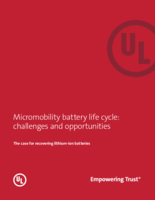
Micromobility battery life cycle: challenges and opportunities
Micromobility products, electric vehicles that weigh less than 500 kilograms and operate as a low-speed electric vehicle, typically 25 miles per hour (mpH) or less, are rapidly growing in popularity and diversity. And to keep pace with these innovative products entering the market, new standards are emerging to evaluate the safety of the battery, electrical and charging systems. These new standards for safety will help ensure energy is governed and used appropriately through the thousands of cycles of micromobility device charges and discharges.
On December 20, 2022, the U.S. Consumer Product Safety Commission’s (CPSC) has called on manufacturers, retailers, importers, and distributors of micromobility devices to comply with established UL safety standards. This includes products covered by UL 2272 and UL 2849, which address electrical systems in personal e-mobility devices (such as hoverboards) and eBikes, respectively. Click here to access the release from CPSC.
In a move to strengthen fire safety of e-bikes, e-scooters, and the lithium-ion batteries that power such devices, on March 2, 2023, the New York City Council passed Initiative 663-A, mandating e-bikes, e-scooters, e-mobility devices, and light electric vehicle (EV) battery packs to be third-party certified. On March 20, 2023, New York City Mayor Eric Adams signed this into law. With this new law, any company selling, leasing or distributing micromobility devices, such as e-bikes or e-scooters, has until September 16, 2023, to obtain certification from UL Solutions or another National Recognized Testing Laboratory (NRTL) to:
A local law takes effect in September, which will require all of these [micromobility] devices that are sold within the city to be certified by UL Solutions or National Recognized Testing Laboratory.
We evaluate, test and certify micromobility devices to international, national and regional regulations to help manufacturers achieve robust safety designs for their innovative products. To do this, we assess the safety of the battery packs and battery management systems to minimize the potential risk of fire, explosion and electric shock during real-world use for e-bikes, hoverboards, electric scooters and other electric personal transporters. UL Solutions is recognized by Occupational Safety and Health Administration (OSHA) as a Nationally Recognized Testing Laboratory (NRTL) to certify micromobility products to UL 2849, the Standard for Electrical Systems for eBikes and UL 2272, the Standard for Electrical Systems for Personal E-Mobility Devices.
As e-bike technology evolves, new safety strategies and standards are being put in place to reduce the risk of electric shock and fire during use and charging. We test to UL 2849, the Standard for Electrical Systems for eBikes, and to European standards including:
Enhanced functionality and increased adoption of ride-sharing services are driving significant demand for personal e-mobility devices, such as hoverboards, e-scooters and e-skateboards. We assess electrical drive train systems, battery systems and charger system combinations to help manufacturers meet the critical safety requirements outlined in ANSI/CAN/UL 2272, the Standard for Electrical Systems for Personal E-Mobility Devices.
By tapping into our technical expertise and knowledge of emerging micromobility standards, we deliver the highest level of global regulatory acceptance and market recognition in the industry. We help you send safer micromobility devices to market.
UL certification is a valuable marketing tool that tells your customers that your product, process, service or company has successfully met stringent requirements. Communicating this achievement can help you win in the market by strengthening your product’s presence and differentiating it from competitors.
We are a recognized international leader in battery safety, and our engineers apply their unrivaled experience to deliver a comprehensive range of safety testing and certification solutions. Our global footprint and reach will help you meet safety, EMC and local requirements, and gain rapid access to markets around the world. From research and development to product development to final launch, we help you build trust in your innovative micromobility devices.

Micromobility battery life cycle: challenges and opportunities
Have questions, need specifics? Let's get this conversation started.